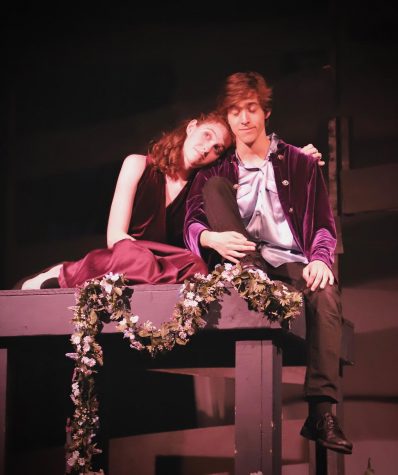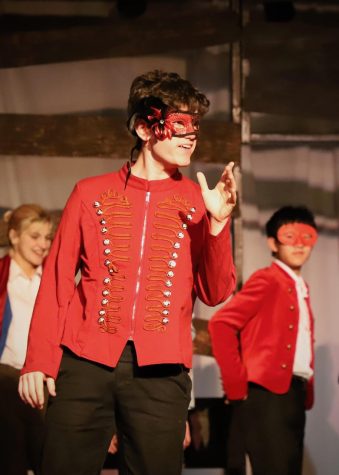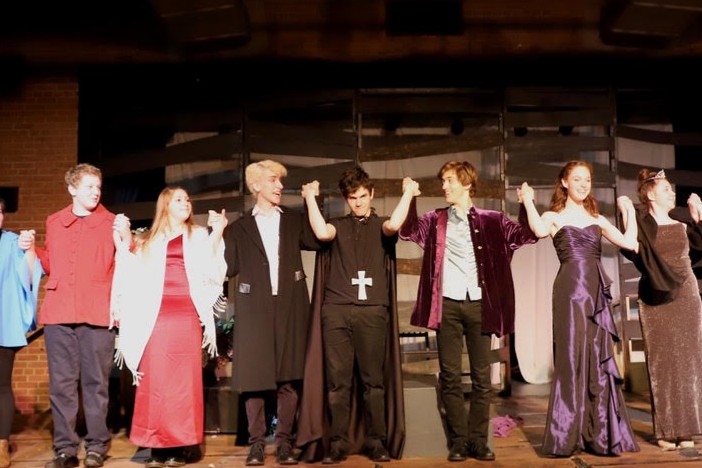Shakespeare club performs Romeo and Juliet—with a twist
The cast of Shakespeare club’s Romeo and Juliet performed May 9 and 11. The student directors set the play during the Revolutionary War, with the Capulets as Loyalists and the Montagues as Patriots. “The actors and the audience both had a lot of fun,” sophomore Marc Blitz, who played Tybalt and Friar Lawrence, said. “We hit our stride.” Photo courtesy June Miller.
May 17, 2019
In a blur of red and blue, the Capulets and the Montagues burst onto the WAUD stage, erupting into a sea of age-old hatred. But instead of Shakespeare’s typical 16th century setting, this production of Romeo and Juliet took place outside the borders of Verona, Italy—in Revolutionary America.

The Shakespeare club performed its spring production of Romeo and Juliet on May 9 and 11. The play, which seniors Eva Liles and Maeve Trainor directed, starred juniors Matthew Millin and Emily Mayo as Romeo and Juliet, respectively.
Unlike Whitman Drama productions, everyone who auditions for a Shakespeare club performance gets a role; in fact, at the beginning of the year, Liles and Trainor received a document from past directors that said “the most important part of this club is that everyone gets in.”
Because the club only has 19 members, six actors had to play multiple characters. Without enough people or funding to have a large technical crew, Liles and Trainor were responsible for
publicity, costumes and soundtracks, in addition to their traditional directing roles.
“I was astounded at how good it was,” faculty sponsor Matthew Bruneel said. “They really pulled it together.”
Because the play was student-directed, rehearsals had a relaxed atmosphere, sophomore Marc Blitz, who played Tybalt and Friar Lawrence, said. In addition, cast members had more freedom to play their roles in different ways.

Photo courtesy June Miller.
The directors decided to set the play in colonial America during the Revolutionary War; the Capulets were Loyalists, and the Montagues were Patriots. The shift in time period forced Liles and Trainor to rewrite parts of the script—keeping the language in the Iambic Pentameter was a challenge, Liles said. “Verona” became “Virginia,” “Mantua” became “Maryland,” and “sword” became “gun.”
“Our productions are rarely set in the time period that Shakespeare wrote,” Trainor said. “We wanted to do something that wasn’t in the past century. Because it was Romeo and Juliet, we were looking at different historical feuds. We ended up with Patriots and Loyalists.”
Because Shakespeare is such a niche interest, the group forms a different kind of community than other academically-oriented clubs at Whitman.
“The community of Shakespeare club is unique,” Liles said. “It’s a really specific type of nerd who likes Shakespeare; it’s different from quizbowl, different from robotics.”
Essential to this community is the belief that, despite being written in the 16th century, Romeo and Juliet—and Shakespeare’s other works—are still relevant today.
“I hope that when people graduate, when they go to college, they can watch Shakespeare plays, join Shakespeare club, read Shakespeare and remember what they’ve been a part of, and what it has taught them,” Liles said. “Shakespeare makes you smarter.”







